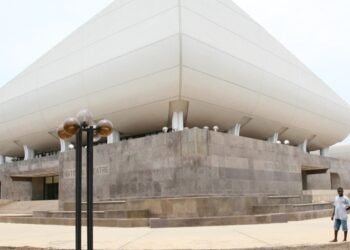Ghana Tourism is more than an economic sector: it is a vehicle for cultural affirmation, community development, and international engagement.
Over the past decade, the government has increasingly recognized this potential, responding with policies and programs that promote heritage preservation, encourage domestic visitation, attract the African diaspora, and build the infrastructure needed for a competitive tourism industry.
While challenges remain, the breadth of recent initiatives provides persuasive evidence that Ghana’s leadership is committed to boosting local tourism as a strategic national priority.
Minister for Tourism, Culture and Creative Arts, Abla Dzifa Gomashie, has reaffirmed the government’s commitment to enhancing and promoting Ghana’s tourism.
She stated that under the Mahama-led administration, 80% of the District Assembly Common Fund will be allocated to District Assemblies to strengthen tourism activities at the local level.
The Minister underscored her ministry’s dedication to supporting the work of tourist guides, professionals in the textile and gastronomy sectors, as well as all individuals involved in the tourism industry.
“The district assemblies are going to get 80% of their common fund. That kind of resource is what you and I are going to use to promote tourism locally in all the communities. If you are in the gastronomy sector, textiles, beauty, or tour guiding, know that you have a place under the Tourism Ministry and through the regional officers, appeal to us and we will support you to promote your work.”
Abla Dzifa Gomashie
She further urged Ghanaians to actively participate in the government’s flagship Black Star Experience initiative, aimed at promoting the country’s rich cultural heritage. “When you have found it, we under the Ministry of Tourism, Arts and Culture will help you unearth it further and promote it for the world to cherish,” she added.
A government’s commitment shows first in policy and institutions. Ghana has strengthened the institutional backbone for tourism through the Ministry of Tourism, Arts and Culture and the Ghana Tourism Authority, which coordinate promotion, regulation, and capacity-building across the sector.

National-level tourism strategies and master plans have emphasized diversification of product offerings, improved standards, and the integration of tourism into broader economic planning.
This institutional focus signals that tourism is treated as more than a sidelined industry—it is an engine of jobs, entrepreneurship, and regional development.
Few initiatives illustrated Ghana’s commitment as publicly and effectively as the “Year of Return” in 2019. Launched by the Presidency and tourism agencies, the campaign invited members of the African diaspora to visit and invest in Ghana, bringing an influx of visitors, business interest, and global media attention.
The follow-up “Beyond the Return” campaign sought to translate that momentum into long-term cultural and investment relationships. These marketing efforts demonstrate a strategic vision: Ghana is packaging its history, culture, and hospitality to capture diaspora travel and global tourism market share—while raising the country’s profile internationally.
Ghana’s forts, castles, festivals, and cultural museums are central to its tourism identity.
Government-led restoration and maintenance of heritage sites—especially the forts and castles along the coast—underscore a commitment to conserving assets that attract visitors and preserve national memory.
Support for Community-Based, Sustainable Ghana Tourism

Boosting local tourism requires inclusive approaches that spread benefits beyond major urban centers. Government policies and programs increasingly emphasize community-based tourism—supporting tourism enterprises in villages and small towns, enabling local entrepreneurs to offer homestays, guided nature experiences, and craft markets.
There is also growing rhetoric and action around sustainable and eco-friendly tourism practices, recognizing that long-term viability depends on protecting natural resources and ensuring communities benefit from visitor spending.
Tourism growth depends on human capacity and private-sector investment. Government-backed training programs for hospitality workers, tour guides, and small business owners are improving service quality.
At the same time, policy incentives and public-private partnerships encourage hotel development, airlines’ route expansion, and new attractions.
By combining regulation, training, and incentives, the government is creating an environment where the private sector scales and professionalizes tourism offerings.
The government’s commitment is grounded in local tourism’s clear economic rationale: it generates jobs, foreign exchange, small-business opportunities, and catalyzes investment in transport and urban infrastructure.
For many communities, especially along the coast and in regions with national parks and cultural sites, tourism provides critical livelihoods. Strengthening local tourism, therefore, advances both economic development and social objectives—reducing regional inequalities and fostering pride in Ghanaian heritage.

Despite the progress, gaps remain. Connectivity to some tourist regions is still inadequate, standards and signage are inconsistent, and informal service providers need more training and access to finance.
To consolidate gains, the government should continue expanding domestic marketing campaigns to encourage Ghanaians to travel within the country, deepen investment in sustainable transport links, scale vocational training for hospitality and tourism management, and streamline incentives that attract responsible private investment.
Ghana’s recent policies, campaigns, and investments provide convincing evidence of government commitment to boosting local tourism.
From the global visibility of the Year of Return to practical investments in infrastructure, heritage conservation, and community tourism, the state has signaled that tourism is a strategic priority.
Sustained political will, targeted funding, and strong partnerships with the private sector and communities will be key to converting that commitment into inclusive growth, new jobs, and a richer national narrative that both Ghanaians and global visitors can share.
The government has started well; with continued focus, tourism will become a durable pillar of Ghana’s development.
READ ALSO: Colonial Arrogance Clouds Ghana Judiciary Dispute























